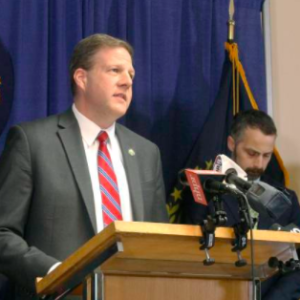Gov. Chris Sununu told NHJournal the state budget could be facing a “revenue hole somewhere in the neighborhood of $500 to $700 million” due to the coronavirus crisis, but says he opposes any broad-based tax hikes to fill it.
The COVID-19 pandemic has wreaked havoc on the Granite State’s economy and, by extension, tax revenues. Jobless claims have soared to a record 191,000, while revenues have plunged. For example, the two business taxes — the business enterprise and business profits taxes — were projected to bring in $147.7 million in April, but instead collected just $89.9 million, a $57.9 million one-month shortfall.
Asked what number his administration is using to plan for the budget future, Sununu said, “the revenue hole that the state will be looking at is somewhere in the neighborhood of $500 to $700 million. There’ll be about $150 million through June 30 of this year, and then potentially another $350 to $450 million in revenue losses next year, though it could be more.”
Sununu believes the federal government will provide some help covering the shortfall. But even if it doesn’t, Sununu says, he doesn’t support calls for considering a broad-based tax increase, such as an income or sales tax.
“Absolutely not, we should not be passing broad-based taxes. I know the Democrats tried to pass their income tax last year. There was broad support from the Democrats in the House and the Senate. Well, as much as they want to keep pushing those ideas, we’re going to veto them because that is not what New Hampshire does,” Sununu said. “We can manage our way through.”
During an appearance on Jack Heath’s radio show earlier in the day, Sununu was even more blunt about Democrats and taxes: “If you put Democrats in the House and the Senate, you’re getting an income tax,” Sununu said.
“You hear ‘Oh, an income tax might come because of this giant financial crisis.’ They were trying to do it way before this crisis even happened. You can be darn well sure they’re going to do it if they get control of things here,” Sununu said. “Let’s be very clear: every Democratic state senator voted for an income tax.”
New Hampshire Republicans claim Democrats backed an income tax when they supported a paid family medical leave plan proposed by Senate Majority Leader Dan Feltes — one of two Democrats hoping to challenge Sununu in the fall. Feltes and his fellow Democrats reject that claim, insisting that the money withheld from workers’ paychecks to cover the cost of paid leave is akin to an insurance payment.
In fact, it’s more like a payroll tax.
State Sen. Lou D’Allesandro, one Democrat called out by Sununu, told NHJournal the governor was incorrect. “I have never voted for an income tax,” D’Allesandro said. As for the budget shortfall, D’Allesandro is optimistic.
“Now is not the time to panic. This is a time to manage the budget, take full advantage of the federal monies that are coming into our state, use them wisely and work with the legislature. I have been here before as have many other legislators. Life is a series of problem-solving exercises.”
At least one prominent Democrat, candidate for governor and Executive Councilor Andru Volinsky, has acknowledged his willingness to consider a state sales or income tax if he believes it’s needed.
“We’re not going to have usual tax revenues. We’re headed into uncertain times and I’m not taking anything off the table… because we don’t know what we’re facing,” Volinsky said last week. “I think ‘The Pledge’ is a silly anachronism from years past. I’m not going to be cowed into taking things off the table for political reasons.”
Feltes isn’t on the same page as his Democratic gubernatorial rival.
“Senator Feltes has never voted for an income tax bill, and would veto one should it reach his desk,” Feltes spokesperson Emma Sands told NHJournal. “While Governor Sununu and Councilor Volinsky are stuck in the same tired battle of the past, Senator Feltes is moving forward and focused on building a brighter future for all working families.”
The pragmatic question remains: Is a $600 million hole in a $6 billion single-year budget simply too big to fill without raising taxes? Greg Moore of Americans For Prosperity-New Hampshire doesn’t think so.
“In 2011, the state was in quite an economic jam, and we were able to pass a budget that reduced state spending by over $535 million in general fund dollars and over $1.2 billion in total funds, at a time when the state’s Rainy Day Fund was empty,” Moore told NHJournal. “Now, with $120 million set aside for the Rainy Day Fund, plus a state budget that grew spending by over $1 billion, there is certainly the opportunity to bring the budget back to reality.”
“We’ve done it before, we can do it again.”
GOP Senate leader Chuck Morse also pointed to 2011 as an example of confronting a budget challenge without a broad-based tax hike. “When we took over in 2011, there was an $800 million deficit and no place for us to go to get the money. Today, we’re in much better shape, and I truly believe Gov. Sununu can help us manage our way through the process.”
As for Democratic calls for new taxes:
“Raising taxes on a weak economy is insane. Any time you try to build government through a taxation model, you’re going to fail. Unfortunately, the one thing Democrats have always done is try to use a crisis to build more government,” Morse said.

